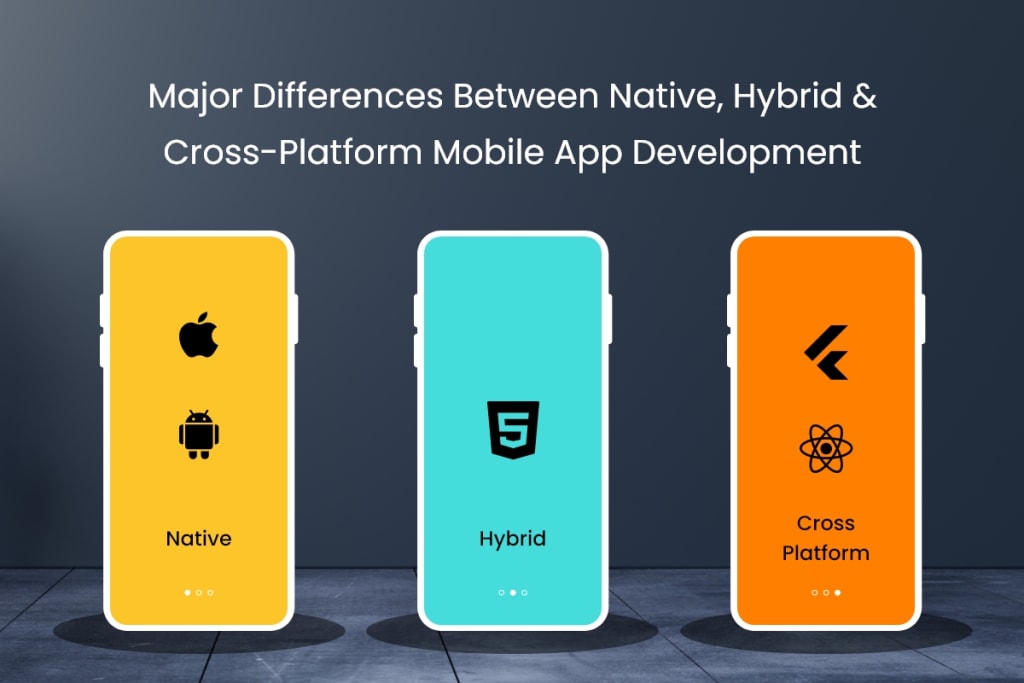Native v/s Hybrid v/s Cross-Platform Mobile App Development - Which one is ideal?
If you want to develop a mobile app for your business, you need to understand the different approaches to make an informed choice. Let's compare 3 approaches to help you decide!

The advent of technology has made our lives confined to digital assets. Mobile apps make everything possible and nowadays, it helps us make some major decisions in our lives and businesses. Behind every app floating in the market today, there is a lot of effort and brainstorming to provide the consumers with the best possible features and features.
Before starting the development, a developer gets debated about which platform to choose for their app. There are multiple options available for picking up a platform to get their mobile app developed. Their choice includes cross-platform app development, native app development, or hybrid app development.
People often ask which platform they should choose and the right development method for small and medium businesses. When hiring mobile app development services, you will have to let the company know about your requirements. This is why we decided to share our insights with our readers.
Our blog will help you understand the difference between choosing among the different development methods. Keep reading if you are looking forward to making the best decision based on your project.
What is Native Mobile App Development?
Applications developed and built for a particular mobile operating system is known as native mobile app development. To develop such an app, a specific programming language is used that proves the development of the mobile app ideal. For example, different languages are used to develop mobile apps for android and iOS, respectively.
The business owner must understand that native app development enables developers to leverage the full potential of a mobile device and its operating system before they outsource mobile app development. Also, native apps are smoother, faster, and more polished than the apps developed using other platforms.
Advantages of Native App Development
- High Speed: Complex codes are not used during native app development, and hence the apps developed are blazingly fast. All elements of the app function smoothly and swiftly. The majority of the elements of your display rapidly get preloaded in advance.
- More Interactive and Intuitive: In native app development, developers can access the layout features so that the aspect ratios can be tailored according to different screen sizes. Since native apps are built for specific operating systems, they adhere to the guidelines to ensure that the app provides an enhanced user experience that perfectly aligns with specific operating systems.
- Utmost Performance: Native app development enables the development of optimised apps for a particular platform to provide high performance. The apps are compiled using core programming languages and APIs that make native apps efficient.
Cons of Native Apps
- No Code Reusability: If the developers have to build android and iOS, they will have to do the coding separately for different operating systems. This requires a lot of time, resources and effort, unlike developing hybrid apps.
- High Maintenance: Native app development involves high maintenance costs that are much higher than the actual development cost.
- Need more skills and talent: Since the development of native apps requires knowledge of a specific language, it becomes challenging to find developers who are competent enough to build native apps back to back.
When to Consider developing native apps? Best native app examples
- There is a need to code specifically for one platform.
- You are launching your app for the first time, and you want your users to obtain the best possible user interface experience.
- You are looking forward to adding functionalities specific to a device that includes a camera, GPS and so on.
Some examples of the best native apps include Artsy, Spotify, Google Maps, and Pinterest.
What is Hybrid Mobile App Development?
Hybrid mobile app development services include one of the most contemporary app development processes. It serves as a bridge and combines the strength of web development and the device's resources to offer an exceptional user experience. Considering the technologies, hybrid apps are developed using Javascript, HTML5 and CSS. They also have shells to make the app store ready.
Browsers are not required to use hybrid apps, and they can make use of plugins and APIs of the user device.
Pros of Hybrid Apps
- Rapid Time to Market: Startups are often after shipping their MVP faster to the market. That said, hybrid app development is an ideal solution that enables developers to rapidly develop and launch their products in the market. If you are a startup, outsource mobile app development needs to get hybrid apps developed.
- Easy Maintenance: Because hybrid apps are based solely on web technology, maintenance of hybrid apps becomes easy compared to cross-platform and native apps with difficult coding.
- Improved UI/UX: Hybrid apps enjoy the benefits of web and native apps and also offer enhanced and flawless user experience throughout iOS and Android platforms. Such apps have a lightweight hybrid app UI that enables the graphics and content to load rapidly.
Cons of Hybrid Apps
- No Offline Support: Hybrid apps don't have offline support like native apps. Internet connection is a must to access the functionalities of a hybrid app.
- OS Inconsistencies: Since a single code is deployed in hybrid apps, it has specific features to a specific operating system. Such functions may not work perfectly well on other operating systems. For instance, iOS-specific functions will not work well on Android devices and vice versa.
When to consider developing Hybrid apps? Best examples of Hybrid apps
- You plan to distribute a single app throughout the app stores.
- You desire to avail mobile native features, including camera, GPS, and so on.
- You want users to operate the app seamlessly across varied platforms and have enough time to build cross-platform apps.
Best examples of Hybrid apps include Evernote, NHS, Gmail, Airbus Helicopters, etc.
What is a Cross-Platform Mobile App?
Cross-platform mobile apps are the opposites of native mobile apps. Unlike native apps, the process of cross-platform app development involves using one code to develop and deploy apps across multiple platforms. This process doesn't include individual development or platform-specific programming language.
The cross-platform app development class process is a blessing for small and medium business owners as it reduces the development cost to a great extent.
Pros of Cross-Platform Apps
- Hassle-Free and Rapid Development: When developers get reusable code backed by enhanced efficiency and productivity, they enjoy several benefits along with business owners in the long run. Hence, it gains a competitive edge over other choices.
- Reduced Cost: Cross-platform app development framework has the potential of supporting all kinds of platforms. In addition, such apps ensure a global market reach that increases brand popularity. At the same time, it provides reduced upfront expenses.
- Code Reusability: As far as cross-platform apps are concerned, developers are not required to write code multiple times for different platforms. A single codebase can be transformed to build an app for a different platform.
Cons of Cross-Platform Apps
- Complicated Development Lifecycle: You will need a team of skillful developers capable of developing apps that can adapt to different platforms. Developers must pay close attention to the minor differences between hardware and operating systems while implementing complex interfaces and functionalities.
- Difficult Integrations: It is often challenging for the developers to integrate cross-platform apps to local settings and the code of cross-platform HTML5 is complicated because of callback style programming.
When to consider developing a cross-platform app? Best examples of cross-platform apps
- You need rapid app development.
- The app is not complex and doesn't need functionalities that differ greatly between the platforms.
- You are looking to target both iOS and Android users.
Best examples of cross-platform app development include Skype, Reflectly, Insightly, Slack, etc.
Conclusion
No matter which industry your business operates in, it has become significant for businesses to invest in mobile apps. Moreover, they are also required to develop an app that perfectly suits their requirements, business nature, consumer expectations, etc. The choice of platform depends entirely on the unique business needs so if you want to outsource mobile app development services to develop robust & high-quality mobile apps you are at the right place. Each option has its pros and cons, and you are required to take the bigger picture into account and comprehend the aims you want to achieve through the mobile app.
About the Creator
Vikrant Bhalodia
An Avid Writer by nature. Head of HR & People Ops | OD Expert @ WeblineIndia, a leading Software Development Company in USA & India.






Comments
There are no comments for this story
Be the first to respond and start the conversation.